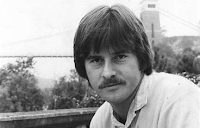Following
Blue Peter on Monday evenings, homework had to take a back seat because this
adventure serial starring Francis and another children’s TV regular, Simon
Turner, became essential viewing. I can’t recall the plot, other than the stars
were either on the run or in search of something around the country trying to
evade the sinister attentions of the leather-clad Hilary Minster on a motorbike.
They
were supposedly teenagers although Jan Francis, then sporting long dark hair,
was already well in her mid-twenties. It didn’t matter in the slightest, at
least not to an eleven year-old. It was quite an exhilarating ride, with high
production values for a children’s show. This was hardly surprising given it
was created by prolific Seventies BBC uber-producer Gerard Glaister and written
by regular collaborator NJ Crisp, who together at the time were also
responsible for Colditz and The Brothers.
Apart
from guest appearances in a few series such as The Duchess of Duke Street, the next time I watched Jan Francis in
a major role came five years hence in another Glaister production, Secret Army. We watched every week
without fail, following the trials and tribulations of the wartime Belgian
Resistance running an escape line for Allied airmen under the noses of Nazi
forces. Francis played ‘Yvette’,
who ran the operation using the cover of a popular café, owned by Bernard
Hepton’s ‘Albert’. With all manner of intrigue, conflicts within as well as
between the Resistance and the Germans, and an excellent cast it was a
beguiling blend of suspense and melodrama. However, it was so earnest that it
provided rich pickings for a send-up. Come the Eighties, Allo Allo mercilessly ripped the piss out of Secret Army, from the basic set-up, costumes and characters.
Personally I will never again see Jan in her raincoat and beret without hearing
Kirsten Cooke uttering her immortal catchphrase: “Listen very carefully, I
shall say zis only wurnce”….
It’s
not unusual for actors to work with directors, producers or fellow thesps on
several projects over the years. Jan Francis is no exception. Between 1985 and
2007, I saw her in three dramas, each of them starring Dennis Waterman. I
recall her playing the posh girlfriend of Waterman’s ‘Terry’ in Minder (obviously their on-screen
relationship could never last!) then the two of them topped the bill in ITV’s Stay Lucky.
This continued the theme of an unlikely emerging relationship involving a dodgy
geezer and posh totty and ran for four series between 1989 and 1993.
Good
old Dennis was still “singing the feem tune” in the Noughties on New Tricks and in one 2007 episode, he
and Jan Francis were reunited, along with ageing Minder co-star George Cole.
Jan’s hair may have boasted highlights appropriate to a fashionable sixty
year-old but those blue eyes were as intense as ever.
Two
years had passed when she portrayed another well-spoken lady of a certain age
in Mistresses. She was mixing it with
four brilliant female leads including Sarah Parish and Orla Brady, and I could
imagine her younger self being similarly successful in the series.
Nevertheless, her career as chic, smart, shrewd but somewhat uptight young
women reached its apogee in the Eighties sitcom Just Good Friends.
Essentially
it was a love story. Jan’s Penny Warrender was one half of another ‘will-they-won’t-they?’
relationship with a jack-the-lad, this time in the form of her ex-fiance Vince,
played with an understated knowing twinkle by Paul Nicholas. It was sweet
without being cosy, intelligent but not up itself, and the likeable leads
brought a freshness to the John Sullivan script. At the time Just Good Friends was even more popular
than Sullivan’s contemporary masterpiece Only
Fools and Horses, commanding audiences above twenty million. The 1986
climactic Christmas episode was wrapped up with the inevitable wedding and left
the series on a high.
It
didn’t establish itself in the manner of Only Fools, and it’s perhaps sad that
we can’t enjoy Jan Francis endlessly on Dave or UK Gold in the twenty-first century.
Perhaps an enduring catchphrase might have helped but JGF wasn’t that kind of
comedy. Nevertheless for a few decades she was a regular feature on our screens
and worthy of a place in my pantheon of TV treasures.
